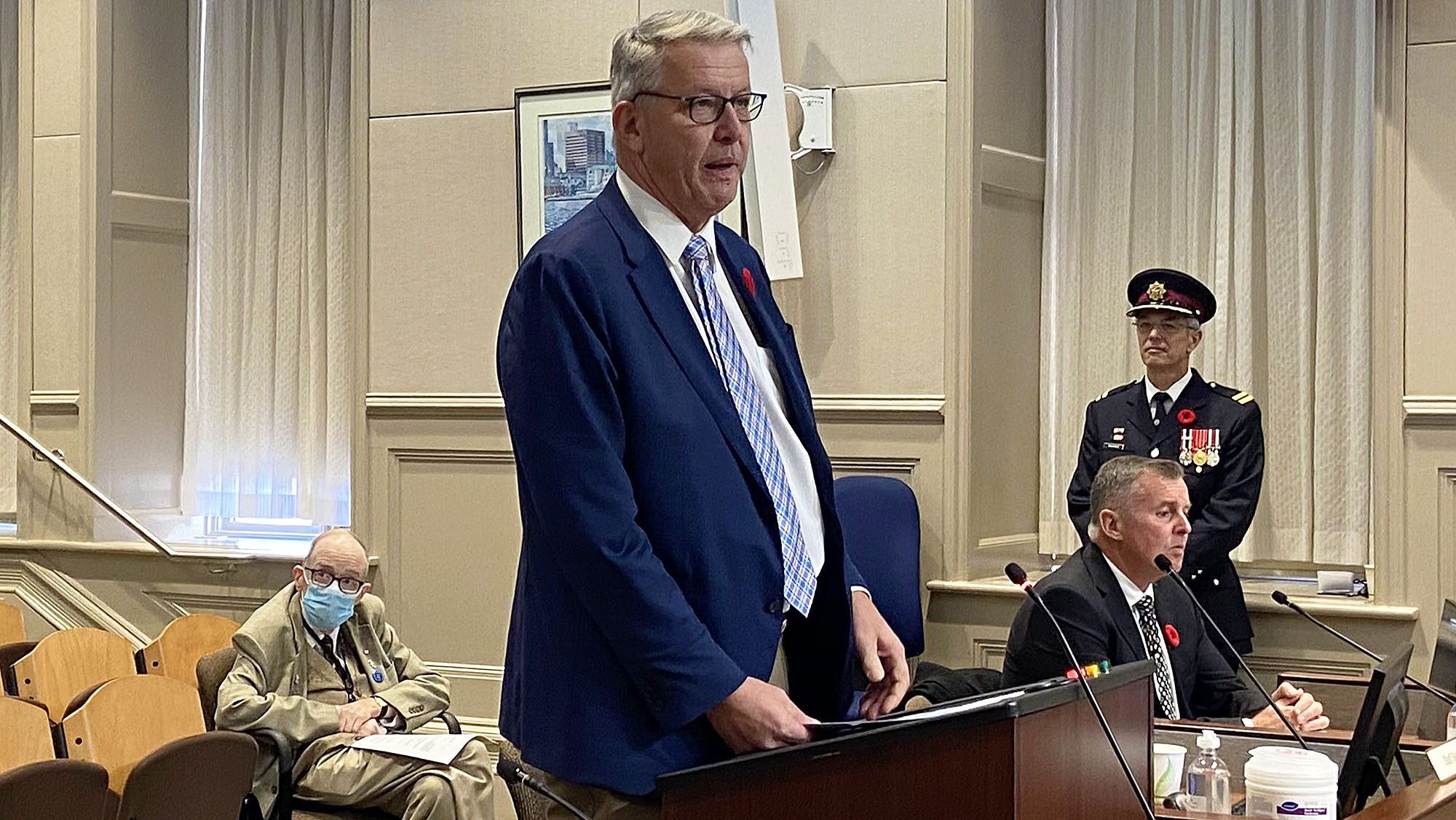Nova Scotia’s housing minister goes up against city councillors
In rare move, John Lohr attends HRM council meeting to defend his new bill

caption
Provincial minister John Lohr defends a bill on housing bylaws in Halifax at Tuesday's council meetingHousing and Municipal Affairs Minister John Lohr took heat from both Mayor Mike Savage and Halifax regional councillors on Tuesday after defending a controversial new bill.
The bill will amend Halifax Regional Municipality’s charter to give the housing minister the power to nullify city bylaws that affect housing and construction. Lohr said the city needs to allow more construction to help solve the housing crisis.
He argued that the bylaw would increase the time it would take for buildings to be completed and called the housing situation in Halifax “a crisis of affordability.” He said the crisis was an opportunity to make changes.
After the meeting, the bill passed third reading at Province House. It is now awaiting royal assent. Related stories
Lohr has said the bill is in response to the HRM’s noise bylaw. Councillors agreed in August to amend the bylaw to limit weekday construction hours by 90 minutes, from 7 a.m. to 8 p.m. The changes are set to take place Nov. 21.
However, Bill 225 does not mention the bylaw. The only stipulations are that the bylaw be related to housing, passed within the last six months, and that it be in the public’s best interest to nullify the bylaw.
“Why hang the sword of Damocles over our heads here at city hall, potentially to be used in any way in the future on other legislation that we pass?” Coun. Sam Austin asked Lohr.
In his presentation, Lohr pointed to a 2020 Canadian Homebuilder’s Association report, which rated Halifax near the bottom for building approval timelines. That means the city was one of the slowest in Canada to approve development applications, averaging 18 to 26 months.
Coun. Waye Mason argued the city approves fewer applications because it tries to be careful with tenders.
Lohr also said the province gave HRM $2.3 million to complete studies for special planning areas. He said it took the city seven months to issue the first request for a proposal.
In an interview after Lohr’s presentation, Austin said he has no idea why it took so long for the city to use the money. He said there’s a process and that seven months might be reasonable.
Lohr also argued his bill was justified on the basis of a report from the province’s auditor general.
“A damning auditor general’s report about public housing has given me as minister the social licence to tackle the problems in housing, and I’m doing that,” he said.
Earlier this year, an audit of the Department of Municipal Affairs and Housing’s management of government-owned public housing found that the department wasn’t efficiently using its public housing resources, had a poor governance structure and needed to improve the public housing application process.
Nine of the 16 councillors, including Austin, spoke out against the bill and asked questions of Lohr, who said he would reply at a later date.
Several councillors were concerned about how future ministers, rather than Lohr himself, might use the bill.
“The next minister that comes along may not have the same belief in community service that you do,” Coun. Pam Lovelace said. “And so I’m asking you to drop Bill 225.”
During the province’s law amendments committee meeting on the bill last week, Liberal MLA Lorelei Nicoll tried to change the wording of the bill so that it could only suspend bylaws, but Conservative MLAs voted the amendment down. Nicoll, a former regional councillor, was at the council meeting on Tuesday.
Austin also asked Lohr why he waited so long to speak out about the bylaw.
In his presentation, Lohr said he hadn’t heard of the bylaw until a breakfast with Savage in October.
However, Savage said the bylaw had been tabled in July.
“So either you did hear about it and didn’t tell us or deliberately it was kept from us,” he said.
Some councillors, including Lovelace and Austin, were frustrated that Lohr did not consult council before tabling the bill. Mancini and Austin were also concerned that the bill is undemocratic.
“The people’s democratically elected representatives and our decision making … all of that public process and accountability has been replaced by just the stroke of a pen of one man,” Austin said in the interview.
The bill was amended last week to require consultation with marginalized communities, including African Nova Scotians and Mi’kmaq communities, if the bylaws affect those communities.
About the author

Anna Mandin
Anna Mandin is from Calgary, Alberta. She's a 2022 World Journalism Institute graduate and was a 2022 summer radio intern at World Magazine....
